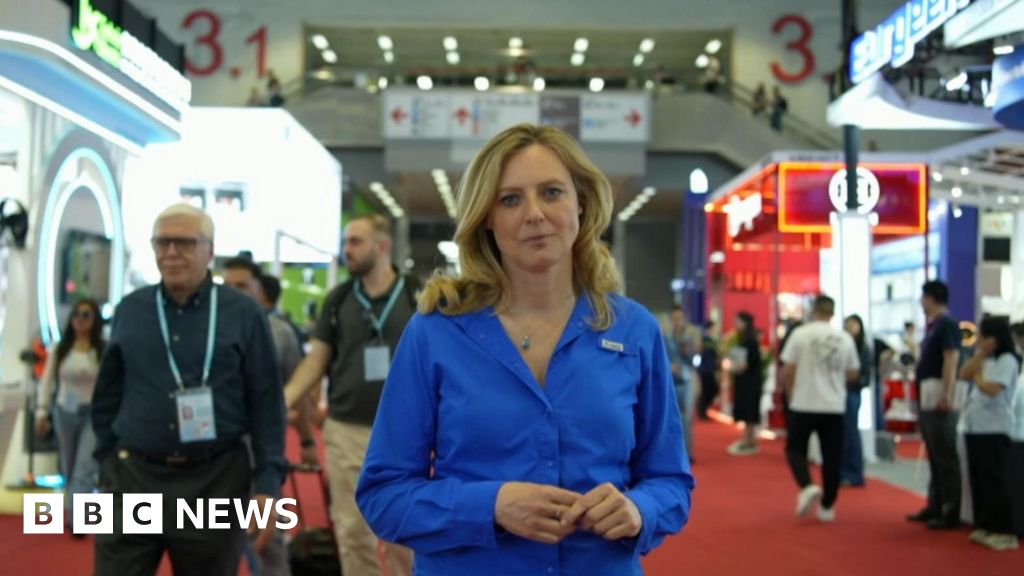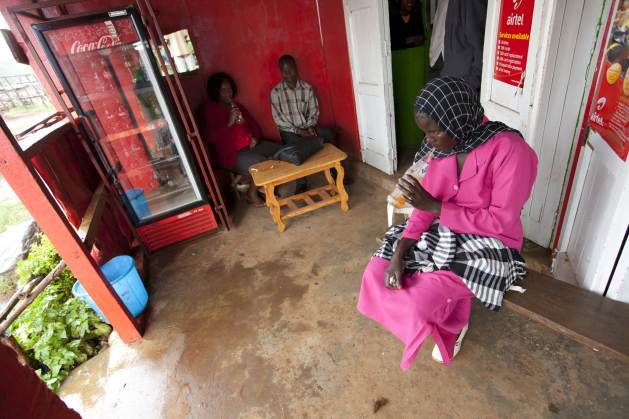Blinken, Beijing signal slight thaw after day of discussions in China
U.S. officials also agreed to hold “working-level” meetings to address specific challenges, said senior State Department officials, who spoke on the condition of anonymity to describe sensitive discussions.
U.S. officials spoke far more positively about the day’s discussions than they did during February’s meetings of Chinese counterparts on the sidelines of the Munich Security Conference. During those meetings, Washington angered Beijing after airing U.S. concerns about China potentially providing lethal aid to Russia. On Sunday, U.S. and Chinese officials made “progress” on their three key objectives: reestablishing senior-level communications, airing concerns and exploring areas for cooperation, the State Department officials said.
On the Chinese side, Qin described the discussions as “candid, in-depth and constructive,” according to a readout released by the official state broadcaster CCTV.
Qin said the two sides agreed to follow the consensus reached by Presidents Biden and Xi Jinping when they met last year to “stabilize” ties. He added that the two nations discussed increasing passenger flights between China and the United States and encouraging the exchange of more students, scholars and business people.
Before Blinken’s arrival, China had previewed the tense visit with multiple rebukes of the United States, accusing Washington of engaging in “irresponsible bullying” and living under the “illusion” that it could deal with China from a “position of strength.”
Qin warned Blinken during a call last week that he should “show respect,” and made clear his view that Washington alone was responsible for the abysmal state of relations.
Last month, Biden predicted a thaw in China’s anger over the U.S. downing of its high-altitude surveillance balloon in February. The White House has indicated that Blinken’s trip could unlock meetings between U.S. and Chinese officials, including a leader-to-leader engagement with Xi.
Blinken arrived in Beijing early Sunday local time with a full agenda of meetings: with Qin; Wang Yi, the Communist Party’s top foreign policy official; U.S. business leaders; American Embassy personnel; exchange students; and potentially Xi himself.
The first meeting between U.S. and Chinese officials at Beijing’s famed Diaoyutai State Guesthouse was a large affair, with Blinken and nine of his aides across the room from Qin, the foreign minister, and eight of his aides. The meeting lasted an hour longer than scheduled.
During the talks, Blinken emphasized the importance of “maintaining open channels of communication” to reduce the risk of miscalculation, State Department spokesperson Matthew Miller said in a statement after the meetings.
A statement released by China’s Foreign Ministry said Qin communicated Beijing’s “clear demands” regarding Taiwan, the U.S. partner that Beijing claims is part of China. Qin called on Washington to “truly fulfill” its promise not to support Taiwan’s independence.
After Blinken’s arrival, Hua Chunying, an assistant foreign minister, wrote on Twitter, “Hope this meeting can help steer China-U.S. relations back to what the two presidents agreed upon in Bali,” referring to a meeting between Xi and Biden on the sidelines of the G-20 Summit in November that temporarily mitigated spiraling tensions.
When asked about Blinken’s frosty welcome from Chinese officials, a senior State Department official said the secretary is “well aware of the current state of the bilateral relationship” and underscored that both sides would be “candid” in expressing their concerns.
Besides improving communications, Blinken’s team is interested in working on increasing the number of commercial flights between the United States and China, and on finding ways to lessen the U.S. fentanyl crisis, given that many of the narcotic’s precursors come from China, said the senior State Department official, who, like others, spoke on the condition of anonymity to discuss sensitive diplomatic planning.
After their initial meeting Sunday, Blinken and Qin resumed discussions during a working dinner at the lavish guesthouse complex, which also hosted President Richard M. Nixon a half-century ago during his historic outreach to China. Then, the United States had driven the push for engagement with China — but the power dynamic has shifted dramatically in the intervening decades.
Many times wealthier and more globally connected than it was in the 1970s, China has been flexing its diplomatic muscles recently, brokering a rapprochement between regional rivals Saudi Arabia and Iran, hosting French President Emmanuel Macron and European Commission President Ursula von der Leyen, and flirting with the role of peacemaker on the Middle East and the war in Ukraine.
“Beijing hopes that the handful of diplomatic successes it has had since the balloon incident says to Washington: ‘We are a major power you have to contend with in regions of the world where your influence may be limited or waning. We matter,’” said Amanda Hsiao, senior China analyst at the Crisis Group think tank.
The diplomatic streak has Beijing projecting confidence and independence, but it is coming to the bargaining table with its own needs and vulnerabilities.
Facing an economic slowdown, record youth unemployment and an anemic investment climate, Chinese officials are keen to host Treasury Secretary Janet L. Yellen and Commerce Secretary Gina Raimondo to address U.S. technology restrictions on China and other economic matters. As part of this pro-business push, Xi met with Microsoft co-founder Bill Gates on Friday — a meeting that followed visits to Beijing by JPMorgan Chase CEO Jamie Dimon, Starbucks CEO Laxman Narasimhan and Tesla and Twitter CEO Elon Musk.
Rather than acquiesce to Chinese preferences that top U.S. economic advisers travel first, the White House insisted that Blinken, one of Biden’s closest confidants, be the first to Beijing, according to people familiar with the negotiations.
As a result, Chinese officials view the Blinken visit as a necessary step to unlock follow-up meetings with more immediately desired officials who focus on economic matters, analysts said.
“The most that can be hoped for is the Blinken visit sets the stage for later visits by Secretaries Yellen and Raimondo,” said David Dollar, a senior fellow at the Brookings Institution. “China’s concerned about various trade and technology restrictions but [Blinken’s team] are not the right people to negotiate on those issues.”
On Saturday, Chinese state media and commentators continued to tamp down excitement over Blinken’s arrival. The state-run Global Times posted on its account on Twitter, which is blocked in China, that Blinken should “listen carefully to what [China] says” during his visit.
Over the course of the visit, Blinken is expected to be pushed in several directions by key players inside and outside of his meetings.
Top Republicans in Congress are already second-guessing his decision to travel to China. “Once we’re there, we’re beholden to an entirely new process of concessions because of the pressure to present ‘deliverables,’” said Rep. Mike Gallagher (Wis.), the chairman of the Select Committee on the Chinese Communist Party, in a column for the Wall Street Journal.
Michael McCaul (R-Tex.), the chairman of the House Foreign Affairs Committee, criticized Blinken for not imposing new penalties and export controls on China, and instead pursuing “fruitless talks.”
But during Blinken’s meetings with U.S. business leaders, he is expected to receive encouragement for pursuing a more accommodating approach to China, which has been furious at the Biden administration’s penalties on Chinese companies and restrictions on sensitive technologies, including advanced semiconductors.
Given the $700 billion in trade between the United States and China, the U.S. business community “remains focused on the importance of the relationship,” said the senior State Department official.
“U.S. businesspeople are likely to ask for a reduction in tensions so there is lower risk and lower acrimony for their businesses in China,” said Daniel Russel, a China expert at the Asia Society.
The most urgent goal for U.S. officials is restoring military-to-military channels with Beijing following multiple dangerous close calls in recent months, including a near-collision of warships near Taiwan and an aggressive fighter jet flyby over the South China Sea.
But Beijing sees the resumption of such channels as potentially legitimizing U.S. military activity targeting China.
“By allowing military dialogue to restart, China worries this will only allow the United States to take more provocative and threatening actions,” said Zhao Minghao, professor at the Institute of International Studies at Fudan University in Shanghai.
Beijing recently rejected a U.S. offer for Defense Secretary Lloyd Austin to meet his Chinese counterpart, Li Shangfu, doubting the “sincerity” of the invitation. Chinese officials are still upset about punishments the United States imposed on Li in 2018 for buying arms from Russia. They also view Washington’s deployment of air and naval assets to the South China Sea as an affront to China’s sovereignty, and believe that improving communications with Washington will simply make the Pentagon more comfortable operating in East Asia, say analysts.
Kuo reported from Taipei. Pei-Lin Wu in Taipei and Lillian Yang in Prague contributed to this report.
Check out our Latest News and Follow us at Facebook
Original Source







